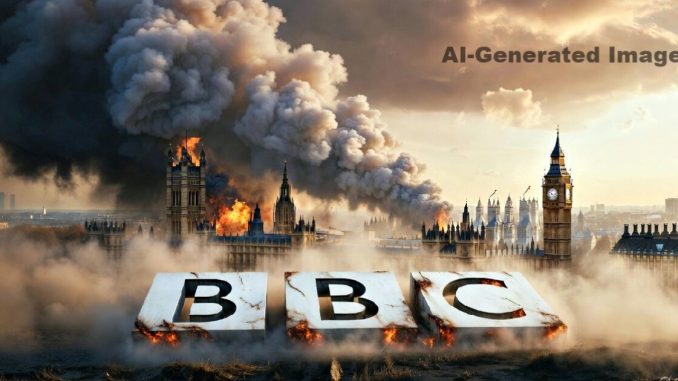
AI-Generated Image by Grok: the BBC is under fire.
Published November 9, 2025
BBC Director-General Resigns Amid Trump Speech Controversy
London, November 10, 2025 — In a dramatic shake-up at Britain’s state broadcaster, BBC Director-General Tim Davie has announced his resignation following allegations of biased editing in a high-profile documentary involving former President Donald Trump. The resignations, which also include the head of BBC News, Deborah Turness, mark one of the most significant leadership upheavals in the broadcaster’s recent history.
The controversy centers on the BBC’s handling of a speech delivered by Trump on January 6, 2021. Internal reports allege that footage was selectively edited to give the impression of a continuous incitement to violence. Specifically, the broadcast spliced together Trump’s call for supporters to “peacefully and patriotically make your voices heard” with remarks made more than 50 minutes later urging his audience to “fight like hell.” Critics argue that this editing misrepresented the context and intent of the speech, raising questions about the broadcaster’s impartiality.
The allegations were detailed in a report by former BBC standards adviser Michael Prescott, which described the editing as “serious and systemic.” As a publicly funded broadcaster, the BBC is held to strict standards of editorial fairness, and the revelations prompted immediate scrutiny from both the public and UK Parliament’s culture and media committee.
The resignations of Davie and Turness signal a rare admission of accountability at the highest levels of the BBC. Senior officials now face the challenge of restoring trust among viewers and ensuring that future reporting adheres strictly to standards of accuracy and impartiality. The broadcaster has pledged to review internal editorial processes and issue a formal apology for the misleading portrayal.
As one of the most prominent public broadcasters globally, the BBC’s credibility is at stake. The controversy serves as a stark reminder of the responsibilities inherent in shaping public perception and the potential consequences when editorial decisions are perceived as biased or misleading.
This video is titled “Revealed: How an edited Trump speech exposed BBC bias” on YouTube. It discusses the claim that the BBC edited separate parts of Trump’s speech to make it appear as if he said “We fight like hell” immediately after “We’re going to walk down to the Capitol, and I’ll be there with you”.
 Implications of the BBC’s Tim Davie resignation and the Trump speech controversy in a clear, structured way. I’ll focus on both media-wide and societal angles:
Implications of the BBC’s Tim Davie resignation and the Trump speech controversy in a clear, structured way. I’ll focus on both media-wide and societal angles:
1. Public trust in media
-
The BBC is one of the most recognized public broadcasters worldwide. Allegations of doctored footage and biased editing can seriously erode trust among viewers.
-
Once trust is lost, it’s hard to regain, even with apologies or leadership changes. People may increasingly turn to alternative media sources, often with their own biases.
2. Accountability in public broadcasting
-
The resignations signal that top management is directly accountable for editorial failures.
-
This may set a precedent: senior editors and directors could face personal consequences if content is misleading, even unintentionally.
3. Political ramifications
-
Editing Trump’s speech in a way that exaggerates violence can become a political flashpoint.
-
Politicians and media critics may use this as evidence of mainstream media bias, fueling partisan debates about “fake news.”
-
This can influence policy discussions around media oversight and regulation in the UK.
4. Regulatory and oversight pressure
-
The BBC is publicly funded via license fees. This controversy may lead to:
-
Stricter editorial oversight internally.
-
Government inquiries into impartiality.
-
Potential adjustments to the BBC charter or funding model.
-
5. Editorial practices and ethics
-
Editors and journalists worldwide may reassess their editing standards, especially when handling politically sensitive content.
-
Highlights the risk of splicing or selective presentation, which can unintentionally create misleading narratives.
6. Impact on global perception
-
The BBC has an international audience. Allegations of bias can:
-
Damage its global reputation as a reliable news source.
-
Influence how other public broadcasters approach transparency and accuracy.
-
7. Lessons for content moderators / media professionals
-
Importance of scrutinizing context: Even small edits can drastically change meaning.
-
The case is a reminder to maintain rigorous verification, document editorial choices, and implement clear whistleblower channels.
-
Demonstrates how institutional culture and leadership affect accountability and credibility.
 Overall Takeaway:
Overall Takeaway:
The BBC’s handling of Donald Trump’s January 6 speech exposes a troubling pattern of editorial bias within one of the world’s most influential public broadcasters. By selectively editing footage to create a misleading narrative, the BBC not only undermined journalistic integrity but also reinforced long-standing concerns about liberal media bias. The resignations of Director-General Tim Davie and BBC News chief Deborah Turness are a rare acknowledgment of accountability, but they also highlight the urgent need for taxpayers and audiences to demand transparency and impartiality from publicly funded media institutions. For those seeking accurate reporting free from political agendas, this scandal is a stark reminder to scrutinize mainstream media claims and hold news organizations responsible for editorial misconduct.
SOURCES: BREITBART – BBC Director General Tim Davie Resigns over Alleged Fake News About Donald Trump
THE GATEWAY PUNDIT – BBC IS MELTING: British State Broadcaster To Apologize for Doctored Editing of Trump J6 Speech, Under Fire for Its Pro-Hamas, Pro-Trans and Climate Change Biases
REUTERS – Britain’s BBC boss Tim Davie resigns following criticism over Trump documentary edit





Be the first to comment